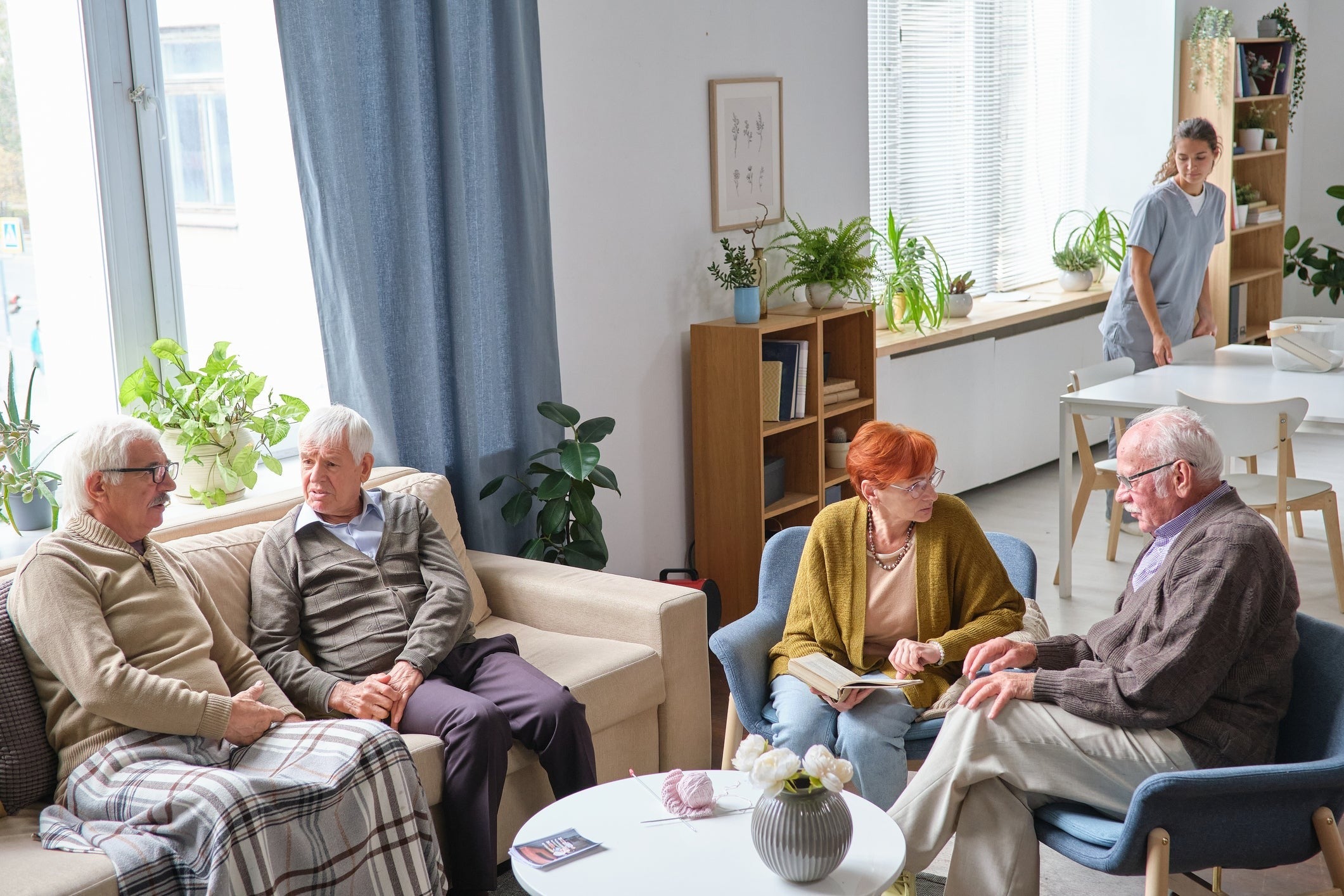- Q and A with the experts: COVID variants
- Sorting waste just got a bit easier
- IQC publishes annual Quantum Impact report
- Alumni Know: Is news entertainment?
- Private equity long-term care homes have the highest mortality rate during COVID-19
- IST staff say so long and thanks for all the fish before heading to the Maritimes
Editor:
Brandon Sweet
University Communications
bulletin@uwaterloo.ca
Q and A with the experts: COVID variants

The University of Waterloo has a number of experts available to speak about issues relating to COVID-19.
Omicron is the latest COVID-19 variant of concern, and it is expected to change the course of the pandemic. But how are variants formed, and what’s the threat level for people who are fully vaccinated? Kelly Grindrod, a pharmacist and professor, and Trevor Charles, a professor in the University of Waterloo’s Department of Biology, provide answers to these questions.
How are COVID variants formed?
Variants are formed through the natural process of evolution. Every time the virus makes a copy of itself, there is a chance mistakes occur. These mistakes result in mutations, which are detected through genetic sequence analysis, and allow the designation of variants that carry shared mutations. While many of those mutations do not change the virus characteristics, some of the mutations can change the virus properties such as transmissibility, disease severity, and immune escape. The resulting variants that carry these mutations are classified as variants of concern.
With these new variants, what does it mean for people already fully vaccinated?
Every time a variant of concern is found, we need to answer three questions:
- Is the variant more transmissible (meaning does it spread more quickly or more easily)?
- Does the variant cause more severe or less severe illness?
- How well do our vaccines protect against the variant?
The Omicron variant of concern appears to be much more contagious than Delta. We will not know with any certainty if it is more or less severe for a few weeks.
The vaccines offer good protection against severe illness, hospitalization, and death from COVID, including the variants of concern such as Delta. The hope is that the vaccines will continue to protect us from severe illness with Omicron.
However, with each variant, the vaccines appear to be getting less effective at protecting against symptomatic illness—which means protecting us from being infected and having mild to moderate symptoms. Many people will need a third dose of the vaccine to protect against Omicron. Similarly, the reinfection rate with Omicron is higher. This means that people who had natural immunity from a previous COVID infection will also benefit from at least two doses of the vaccine to protect against Omicron.
It’s important to note that we are not starting from scratch, even with a variant of concern like Omicron. Each dose of vaccine helped our immune systems recognize the virus—even variants. So being vaccinated will still offer more protection than staying unvaccinated and unprotected.
Will we likely continue to see new variants over a prolonged period?
Looking to the future, all we can know for sure is that more variants will arise since mutations are constantly occurring. It is impossible to predict the outcome, just as no one could have predicted Delta or Omicron variants. Keeping track of the virus through sequencing (both clinical specimens and wastewater) will continue to provide information about the evolution of variants.
Sorting waste just got a bit easier

A message from the Sustainability Office.
If you ever had questions on how to sustainably dispose of items on campus, now there’s an app for that.
Waterloo is pleased to launch its new Shift:Zero waste sorting guide, a digital tool to help the campus community properly sort waste items and identify waste reduction programs at Waterloo. Led by Custodial Services, the project responded to a need from students, staff, and faculty to have better information about how to sort waste.
“Waterloo has been standardizing its core waste streams and receptacles for several years,” says Giovanna Zinken, Associate Director of Environmental Services in Plant Operations. “We provide signage on the bins to help with waste sorting, but there is only so much information you can include before it gets too complicated. The sorting guide is a perfect tool to provide more detail.”
Users of the campus will notice familiar colouring and sorting instructions emerging at waste receptacles across campus – black for garbage, blue for recycling, grey for papers, and green for organics, as well as yellow cardboard bins.
The sorting guide allows users to search whichever items they have on hand and find out which bin to put them in, or to direct them many other campus waste diversion programs for e-waste, writing utensils, batteries, fine paper, furniture, and more.
“As we continue to expand the core stations, each of our sorting actions will drive our waste management success,” says Zinken. “The sorting guide will make it easier for us all to sort waste into the right place, and helps our recycling and organics programs work properly.”
The sorting guide has a web interface, as well as apps for Android and Apple phones. The guide also has an imbedded game that allows users to test waste sorting knowledge, and supports all of the University’s campuses. It also uses the same platform that students and employees may have already become familiar with for local residential waste collection through the Region of Waterloo, to make things even easier.
The sorting guide will be an evolving project. As users search for items, it will enable Custodial Services and the Sustainability Office to better understand what items people find confusing, what new items may be emerging, and where program innovation can occur to reduce waste altogether.
All members of the campus are encouraged to check out the web tool or download the app to help work towards Waterloo’s goal of being a zero-waste campus.
IQC publishes annual Quantum Impact report

The Institute for Quantum Computing (IQC) has launched its 2021 Quantum Impact Report, highlighting IQC's research advancements and impacts on the quantum field.
“Research at IQC explores many avenues of quantum information and is fundamentally interdisciplinary, spanning theory, experiment, and applications,” says a note from the institute. “IQC researchers explore how and why things work, and where they can make an impact, including areas such as healthcare and medicine, communications and security, computing, and entrepreneurship.”
“IQC is the most interdisciplinary quantum centre with the scale, expertise and talent required to position Canada as a global quantum leader.”
Alumni Know: Is news entertainment?

A message from the Office of Advancement.
When you scroll through news and social media feeds, you probably see content specifically curated to your interests and biases. Is this really a news feed? Or is it personalized entertainment?
In the latest episode of Alumni Know, we posed these questions and more to Arjun Moorthy (BASc '99). Arjun is the co-founder and CEO of The Factual, an AI-powered news platform that provides readers with credible perspectives on the day's trending stories. Arjun shares how the platform works, the role of sensationalism and his thoughts on paywalls.
Private equity long-term care homes have the highest mortality rate during COVID-19

The COVID-19 pandemic revealed that for-profit long-term care homes had worse patient outcomes than not-for-profit homes. A new study found that of those for-profit homes, long-term care homes (LTCs) owned by private equity firms and large chains have the highest mortality rates.
The study conducted by researchers at the University of Waterloo traced the growing dominance of financial firms in seniors housing, including LTCs and retirement living.
The study found that nursing homes with the highest profit margins have the lowest quality as financialized ownership and are even more aggressive in seeking to extract value from care homes and the people who live and work in them.
“This study is not focused on the public or non-profit seniors’ facilities across Canada, but rather, the pension funds, private-equity firms, public companies, and other instruments treating long-term care as an asset class,” said Martine August, a professor in Waterloo’s School of Planning and author of the study. “When financial firms own and operate seniors housing, they prioritize profit at the expense of other goals.
“These financial firms derive maximum value in three ways: cost-savings from cutting staff, reducing services, and using government grants to improve facilities thus raising property values for subsequent sale as real estate.”
August said financialization is the process by which real goods and services such as housing and senior assisted living are bundled and traded as investor products like bonds, shares and derivatives, differentiating them from sole proprietors.
August tracked LTC ownership data from 2003 to 2020. In that time, Canada’s top-10 financial firms doubled their holdings of LTCs since 2003. Currently, 33 per cent of seniors’ housing (including 22 per cent of LTCs and 42 per cent of retirement homes) is owned by financial firms. U.S. research offers an important caution, as private-equity ownership of US-based nursing homes was associated with a 10 per cent increase in short-term patient mortality – equivalent to the loss of 21,000 lives.
“Financial firms are in seniors’ housing for what they can take from it, not what they can contribute. This approach – and the prioritization of profits is what guides financial firms,” she said. It’s at odds with the social and moral imperatives that underline the need to provide good homes, high-quality care and dignified environments for our elderly populations and the workers who care for them.”
The study, Securitising Seniors Housing: The Financialisation of Real Estate and Social Reproduction in Retirement and Long-Term Care Homes, was recently published in the journal Antipode.
IST staff say so long and thanks for all the fish before heading to the Maritimes
The IT Professional Development Advisory Group (PDAG) will be hosting Andrea Chappell with Sandra Laughlin for a virtual event on Friday, December 17 entitled "So long and thanks for all the fish..."; An imminent retirement review.
“I travelled from Nova Scotia to Waterloo in the fall of 1984 for a Master of Math," Chappell writes. "My older sister said, ‘you won’t be back.’ I said, ‘of course, I will be!’ I have finally proved myself correct."
Chappell is the Director of Instructional Technologies and Media Services in IST. After four terms completing a MMath at Waterloo, and 33 years working here, she is retiring in her home province of Nova Scotia. She claims to have held 6 (or maybe 8) roles in IST. "She is currently the 8th direct line of Chappell descendants living on the Chappell homestead, the 6th in the farmhouse, in Tidnish Bridge, NS," says her speaker bio.
"As I write this outline early in the week, I can’t commit to specifics (still need to finish slides); but the talk will focus on what I take with me from my time at Waterloo (mostly harmless), and how people make a difference by providing opportunities," Chappell writes. "So, my message may be: to take chances on those opportunities. Or, it could be a restaurant review. We’ll see.”
Moderating the presentation will be Sandra Laughlin, who has been the friendly face of PDAG and ITPD for many years. This is Sandra’s final PDAG as she also is retiring from the University of Waterloo and heading to Prince Edward Island.
The virtual event runs from 9:00 a.m. to 9:45 a.m. on Microsoft Teams.
"An editorial aside from the PDAG Committee – and I think I speak for all of campus: We will miss these two amazing individuals very much.," writes PDAG co-chair Stephen Markan. "IST will not be the same without you."
Upcoming office closures
Counselling Services will be closing at 2:30 p.m. today for a staff meeting.
AccessAbility Services will be closed today from 3:30 p.m. to 4:30 p.m. for their annual staff appreciation/holiday event. The Exam Centre will remain open for pre-scheduled in-person final examinations.
Link of the day
30 years ago: Kazakhstan declares independence from the USSR
When and Where to get support
Students can visit the Student Success Office online for supports including academic development, international student resources, immigration consulting, leadership development, exchange and study abroad, and opportunities to get involved.
Instructors looking for targeted support for developing online components for blended learning courses, transitioning remote to fully online courses, revising current online courses, and more please visit Agile Development | Centre for Extended Learning | University of Waterloo (uwaterloo.ca).
Instructors can visit the Keep Learning website to get support on adapting their teaching and learning plans for an online environment.
Course templates are available within your course in LEARN to help you build and edit your content and assignment pages quickly.
The following workshops, webinars, and events are offered by the KL team (CTE, CEL, ITMS, LIB):
- Independent Remote Course Design Essentials, self-directed, continuous self-enrollment course in LEARN.
- Independent Blended Course Design (iBlend), self-directed, ongoing
- Copyright Overview for Waterloo Instructors and Staff - self-directed, continuous self-enrollment course in LEARN.
Employees can access resources to help them work remotely, including managing University records and privacy of personal information. Here are some tips for staying healthy while working from home.
Stay informed about COVID cases on campus by consulting the COVID case tracker.
The Writing and Communication Centre has virtual services and programs to help undergrads, grad students, postdocs and faculty members with academic writing.
- Meet with writing advisors in one-to-one appointments to brainstorm, draft, revise, and polish. No time for an appointment? Try email tutoring for undergrads.
- Beat isolation and make writing progress at weekly Virtual Writing Cafés for grad students and faculty or PJ-Friendly Writing Groups for Undergrads.
- Take an online workshop or apply to our popular Dissertation Boot Camp program.
- Faculty can request custom in-class workshops for their courses, or the WCC can facilitate any existing workshops for student groups.
Co-op students can get help finding a job and find supports to successfully work remotely, develop new skills, access wellness and career information, and contact a co-op or career advisor.
The Centre for Career Action (CCA) is offering some in-person services for fall 2021. The Tatham Centre is open with front-desk support, limited in-person appointments and co-op consults. Services are also available virtually. Book an appointment online or Live Chat with our Client Support Team. The CCA is here to help.
If you feel overwhelmed or anxious and need to talk to somebody, please contact the University’s Campus Wellness services, either Health Services or Counselling Services. You can also contact the University's Centre for Mental Health Research and Treatment. Good2Talk is a post-secondary student helpline available to all students.
While the Library continues to focus on digital resources and consultations, our spaces are open for the fall term. Dana Porter Library is open Monday to Friday, 9 a.m. to 5 p.m., and Davis Centre Library is open Monday to Friday, 9 a.m. to 11 p.m., and Saturday and Sunday, 11 a.m. to 5 p.m. for drop-in individual study space, bookable individual study rooms, drop-in access to computers and printers, book pick-up services and IST Help Desk support. Special Collections & Archives and the Geospatial Centre will be accessible by appointment. Library staff are available for questions via Ask us. Full details on current services and hours are available on the Library’s COVID-19 Update webpage.
The Faculty Association of the University of Waterloo (FAUW) continues to advocate for its members. Check out the FAUW blog for more information.
The University of Waterloo Staff Association (UWSA) continues to advocate for its members. Check out the UWSA blog for more information.
The Sexual Violence Prevention and Response Office (SVPRO) supports all members of the University of Waterloo campus community who have experienced, or been impacted, by sexual violence. This includes all students, staff, faculty and visitors on the main campus, the satellite campuses, and at the affiliated and federated Waterloo Institutes and Colleges. For support, email: svpro@uwaterloo.ca or visit the SVPRO website.
The Office of Indigenous Relations is a central hub that provides guidance, support, and resources to all Indigenous and non-Indigenous campus community members and oversees the University's Indigenization strategy.
The Waterloo Indigenous Student Centre, based at St. Paul’s University College, provides support and resources for Indigenous students, and educational outreach programs for the broader community, including lectures, and events.
WUSA supports for students:
Peer support - MATES, Glow Centre, RAISE, Women’s Centre - Visit https://wusa.ca/peersupport to book an appointment either in person or online for the Fall term.
Food Support Service food hampers are currently available from the Turnkey Desk 24/7 in the Student Life Centre. Drop off locations are also open again in SLC, DC, DP, SCH and all residences.
Co-op Connection all available online. Check https://wusa.ca for more details.
Centre for Academic Policy Support - CAPS is here to assist Waterloo undergraduates throughout their experience in navigating academic policy in the instances of filing petitions, grievances and appeals. Please contact them at caps@wusa.ca. More information is available.
WUSA Student Legal Protection Program- Seeking legal counsel can be intimidating, especially if it’s your first time facing a legal issue. The legal assistance helpline provides quick access to legal advice in any area of law, including criminal. Just call 1-833-202-4571.
Empower Me is a confidential mental health and wellness service that connects students with qualified counsellors 24/7. They can be reached at 1-833-628-5589.
GSA-UW supports for graduate students:
The Graduate Student Association (GSA-UW) supports students’ academic and social experience and promotes their well-being.
Advising and Support - The GSA advises graduate students experiencing challenges and can help with navigating university policies & filing a grievance, appeal, or petition.
Mental Health covered by the Health Plan - The GSA Health Plan now has an 80 per cent coverage rate (up to $800/year) for Mental Health Practitioners. Your plan includes coverage for psychologists, registered social workers, psychotherapists, and clinical counsellors.
Dental Care - The GSA Dental Plan covers 60 per cent to 70 per cent of your dental costs and by visiting dental professionals who are members of the Studentcare Networks, you can receive an additional 20 per cent to 30 per cent coverage.
Student Legal Protection Program - Your GSA fees give you access to unlimited legal advice, accessible via a toll-free helpline: +1-833-202-4571. This advice covers topics including housing disputes, employment disputes, and disputes with an academic institution.
The Graduate House: Community Space Open M - F @ 11:30 a.m. to 6:00 p.m. - We’re open to all students, faculty, staff, and community members. The Graduate House is run by the GSA-UW. Graduate students get special discounts. We are hiring all positions. Bring your resume to the bar.
BIPOC Student Collective - The Collective is a safe space for BIPOC LGBTQ2+ students and aims to foster intergenerational and peer-to-peer support and mentorship. Join the online Discord channel for solidary chats and drop-in sessions.
When and Where (but mostly when)
Healthy Warriors at Home (Online Fitness).
Warriors vs. Laurier Blood Donation Battle. Join your fellow Warriors, donate blood and help us win the Blood Battle against Laurier for a second year in a row. Set up a profile or add the PFL code: UNIV960995 to your account if you have a blood.ca account already. Questions? Contact WarriorsInfo@uwaterloo.ca.
Drop-in to Warrior Virtual Study Halls on Wednesdays from 5:30 p.m. to 7:00 p.m. Come together in this virtual space to set goals and work independently or in groups each week.
Renison English Language Institute continues to offer virtual events and workshops to help students practice their English language skills.
Finance and Student Financial Services will be closed to in-person service in EC5 until the new year. Students, please visit The Centre in Needles Hall or contact Student Financial Services at our helpdesk.
Fall 2021 examination period, Thursday, December 9 to Thursday, December 23.
PDAG Seminar featuring Andrea Chappell: "So long and thanks for all the fish..."; an imminent retirement review, Friday, December 17, 9:00 a.m. to 9:45 a.m., Microsoft Teams.
Co-operative work term ends, Thursday, December 23.
University holiday closure, Friday, December 24 to Monday, January 3, 2022.